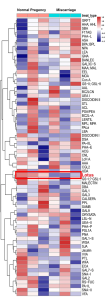A group from Liaoning Provincial Core Lab of Glycobiology and Glycoengineering, College of Basic Medical Science, Dalian Medical University, Dalian, China, etc. has reported that averrant glycosylation (reduced fucosylation) of Mesoderm-specific transcript (MEST) is related to pregnancy failure.
https://www.nature.com/articles/s41419-023-06166-4
By using Lectin microarray, it was discovered that the α1,3-fucosylation, especially difucosylated Lewis Y (LeY: Fuc α1–2 Gal-β1–4[Fuc α1–3]GlcNAcβ1) glycan, in the villus tissues of miscarriage patients decreased comparing with normal pregnancy women. And a novel evidence was shown that decreasing LeY on MEST hampers the binding of MEST and eukaryotic initiation factor (eIF4E2) and inhibits implantation-related gene translation, which leads to pregnancy failure.
MEST, also named as PEG1, belongs to the alpha/beta hydrolase superfamily. MEST is a single chain glycoprotein composed of 335 amino acids. As a maternal imprint gene, MEST is widely expressed throughout the embryonic developmental period. MEST plays a crucial role in the development of embryo and placenta, as well as fetal growth. Inappropriate MEST expression is linked to the increased probability of early spontaneous miscarriage and severe fetal defects, such as growth abnormality, low birth weight, or metabolic disorders in human.
